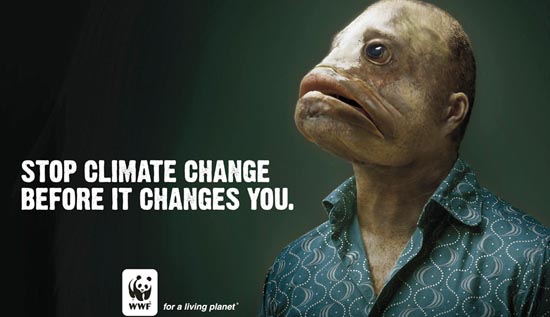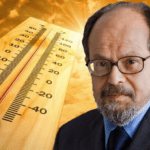
Zoals uit bijgaande afbeelding blijkt, werden de meest dwaze beelden niet geschuwd om de angstpsychose bij het publiek voor klimaatverandering (voorheen opwarming van de aarde) aan te wakkeren. En de campagne had wereldwijd groot succes – wellicht zonder precedent in de menselijke geschiedenis. Maar met de komst van de nieuwe Amerikaanse president lijkt het tij te keren. Als het hem zou lukken de klimaathysterie te beëindigen, is het niet ondenkbaar dat hij – alleen al daarom – als een groot president de geschiedenis zal ingaan.
Hoe zal de klimaathysterie eindigen? Met een knal of stilletjes?
Onder de titel, ‘This is the way the climate scare ends; not with a bang, but a whimper’, schreef Ian Aitken voor ‘Watts Up With That’ (WUWT):
What does the future hold for the climate change debate? Will there ever come a day when we see the headlines across the globe, ‘It’s Official – There Is No Climate Change Crisis’? Hardly – for unless we find some way to leap ahead in the currently highly immature science of climate change and manage finally to pin down the exact direct and indirect (via feedbacks) warming effect of adding greenhouse gases to our atmosphere and the exact effects of natural changes in our climate the outcomes will remain uncertain. …
Ondanks de miljarden die door de jaren heen aan klimaatonderzoek zijn gespendeerd, is er niet veel vooruitgang geboekt ten aanzien van het inzicht in cruciale factoren binnen het klimaatsysteem. Eén daarvan is de klimaatgevoeligheid (het effect van een verdubbeling van de CO2-concentratie in de atmosfeer op de temperatuur), die door de mainstream nog even hoog wordt geschat als dertig jaar geleden.
Having persuaded the world to spend trillions of dollars on fighting man-made climate change is the Intergovernmental Panel on Climate Change (IPCC) really going to admit that the causes of climate change are actually far more complex than they originally thought and so they may have been fundamentally mistaken about both the attribution and quantification of warming?
And what about the UK’s Royal Society and the American National Academy of Sciences, those most renowned of scientific institutions; are they going to admit that they may have put political correctness and scientific funding concerns before scientific objectivity? What about all those climate scientists who have been so careful to tacitly collude with the IPCC and not rock the climate change crisis boat; are they going to admit that their judgments may have been skewed by considerations of the self-interest of retaining their jobs, careers, incomes and pensions? And the many climate research units around the world; are they going to say, ‘Well we must go where the science takes us – if the science says that there actually isn’t a problem then we’ll just have to shut up shop.’ What about all of the senior politicians in the western world who have foisted an avalanche of regulations, taxes and controls on their electorates to ‘fight climate change’; are they going stand up and admit that their scientific illiteracy led them to be completely fooled? Are all those prestigious environmental organizations, such as the WWF, Greenpeace and Friends of the Earth going to admit they had only ‘signed up’ to the global warming scare because it happened to suit their agendas, attracted donations and increased their influence? …
Het antwoord is natuurlijk dat we daar nog lang op kunnen wachten. Maar ondertussen loopt de teller en verdwijnen er dagelijks miljarden in het grote zwarte gat van het klimaatbeleid. Dus het zo mooi zijn als er nu wat schot in de zaak kwam.
Helaas is er op dit moment nog geen duidelijk alternatief voor het AGW-paradigma (AGW=’Anthropogenic Global Warming’) – slechts analyses die op een breed en ingewikkeld interactief complex van natuurlijke factoren wijzen, waaronder de zon, oceaanoscillaties, wolkenvorming enz..
It is a very easy to understand, very alarming problem with a very ‘simple’ solution (‘decarbonize globally’) vs. a very hard to understand, very unthreatening problem with no man-made solution (since we are at the mercy of nature). …
Aitken beschrijft de verschillende fasen van de ontwikkeling van de klimaathype.
1) Scientists misreading the evidence, confusing correlation, cause and effect – and then, long before the science is sufficiently mature to warrant it, leaping to alarmist conclusions
2) Scientists then exaggerating the risks (and suppressing uncertainties and contradictory evidence) in order to attract government funding to investigate the potential scare properly
3) Journalists hyping the potential scare in order to drum up public alarm (and sell newspapers)
4) The public, unable to understand the science, over-reacting and clamoring for political action
5) Politicians, unable to understand the science, over-reacting and responding to public alarm by rushing in ill-considered policies to mitigate the perceived risks
6) Politicians increasing scientific funding in order to find more evidence in support of the scare in order to confirm the rightness of their policies
7) Scientists duly supplying more evidence in order to attract further government funding (this evidence being used by journalists to drum up even more public alarm)
8) A rising awareness by scientists that the problem is actually much more complex (and the causes much more ambiguous and uncertain) than they originally surmised – and, anyway, far less risky
9) A rising awareness by the public and politicians that the risks have been exaggerated and the scare is not materializing – and the policies have done, and are doing, more harm than good
10) Scientists, journalists and politicians quietly retreating from association with the scare
11) The scare fading from the public consciousness
Today we are at about point (8). The trouble is that at this point the investment in the ‘cause’ has been so vast (both in terms of money and reputation/ego) that calling a halt has become virtually impossible (although Trump’s withdrawal from the Paris climate accord would be a good start).
After (11), in the 2030s or 2040s perhaps, we may start to see many PhD theses being written by psychology graduates about the great global delusion of the catastrophic climate change scare of the early 21st century and the extraordinary story of how a small group of highly politicized scientists and computer modelers brought science into public disrepute as never before by corrupting the scientific process in order to achieve their hubristic and utopian goals.
Aldus Aitken in een analyse die verplicht leesvoer is voor klimatofielen van alle gezindten.
Lees verder hier.
Voor mijn eerdere bijdragen over klimaat en aanverwante zaken zie hier, hier, hier, hier en hier.





goedemorgen….toch klopt het niet want ik heb met mijn eigen ogen eergisteren op het journaal het wereldschokkende nieuws gezien dat in n.b. Texas ook de windmolens oprukken…. als dat niks zegt!… dikke texaanse politicus over FEITEN… bijna hilarisch om zijn redeneren te volgen als het niet zo triest was … weer werk aan de winkel Hans! … fijne dag mensen….mvg…monnik bart.
Volgens mij krijgen ze in Texas geen subsidie. Daar draaien de windmolens op wind, dus niet zoals bij ons.
Ik heb er vrede mee wanneer particulieren zonder subsidie energie opwekken. Maar ik ben er sterk op tegen dat linkse en onnozele politici mijn belasting geld gebruiken, verjubelen, om niet bestaande problemen op te heffen.
beste erik…daar heb ook geen idee van maar het gaat me om de uitspraak van de burgemeester: “baseer je op de feiten”… zonder dat er 1 feit genoemd wordt….moest de nos daarvoor iemand naar Georgetown sturen….bedankt voor de info nos!…verbelderend…..mvg..bart..
Erik
het is prima als particulieren energie opwekken maar dan wel voor eigen gebruik of vraaggestuurd.
Zoals het nu gaat wordt het een onbetrouwbare chaos.
Ook is het zo dat dan de dwaasheid van het bouwen van grote windparken zoals Gemini dan zeker niet zal plaats vinden. 4,4 miljard voor minder als 0,3% van onze energievoorziening en dan moeten daar de inpassingsverliezen nog vanaf.
ik moet toch een groter telefoontje kopen of mn duim laten versmallen…sorry wederom voor de tiepfoutjes…
Een “stylus” doet wonderen ;-)
Covfefe! ;-)
Een Chinese wijsheid zegt dat we als het zover is de ‘vijand’ (AGW-ers) door de achterdeur moeten laten ontsnappen; ik denk dat die zienswijze een verstandige is. Ik zal het waarschijnlijk niet meer meemaken, gelukkig maar voor mijn tegenstanders.. :-)
Chinese wijsheid door Sun Tsu in The Art of War: “Onthoofd de leiders en koester de verslagene”. Tegenwoordig dus niet letterlijk te nemen, maar de klimaat-transitie stromannen als Nijpels / Rotmans mogen wel voor een parlementaire enquête-commissie verschijnen omtrent hun flagrante afwijzing van de fundamentele kritiek op de dogmatische AGW-klimaat/energie/duurzaam-wetenschap.
scheffer, waar is de fundamentele kritiek? Ik vraag er al maanden om maar je komt maar niet van de pot,
Henk lees jij alhier met je ogen dicht?
Nee hoor Scheffer, ik lees elke dag deze site met veel aandacht, maar kom nooit fundamentele kritiek tegen, wel veel innuendo en loze beschuldigingen en niet onderbouwde meningen.
maar als je nog eens een linkje geeft waar er hier fundamentele kritiek wordt aangedragen dan zie ik dat graag tegemoet
De Neurenberg Nazi-processen en vervolgens Marshall plan waren volgens het principe van Sun Tsu. De GreenPeace-IPCC-processen zullen …………………
Het zelfportret laat zien dat WWF een te grote bek heeft en te weinig herseninhoud.
Toch maar eens de buitenlandse inmenging gaan beperken, van WWF tot Eritrea.
Henk,in de topics van 27 en 29 mei draag ik fundamentele kritiek aan,maar daar was uw aandacht zeker even wat minder, of had u daar, zoals alle alarmisten, geen antwoord op?
Henk beeldt zich steeds in dat hij een punt scoort, echter steeds in eigen doel. Alle wetenschappelijk kritische argumenten van auteurs en bloggers op climategate.nl, maakt niet uit, schimpt hij af.
Zelf komt Henk met achterhaalde meuk. Inderdaad we zijn in fase 8) “A rising awareness by scientists that the problem is actually much more complex (and the causes much more ambiguous and uncertain) than they originally surmised – and, anyway, far less risky”
Henk zelf is nog in fase 4) en blijkt niet instaat in de progressie mee te groeien.
@Boels Greenpeace zal vast ook een keer bedenken dat je zo’n rare kop krijgt door het eten van genetisch gemodificeerde soja.
@Allen Henk heeft veel weg van het Pepe, het eigenwijze zoontje van het Iberische stamhoofd Paella y Peseta uit Asterix in Hispania. Zo’n houding verhindert onderscheid te maken tussen door blinde eigenwaan gevoede subjectiviteit en aangedragen feiten. Elk zo’n feit wordt dan afgedaan als niet onderbouwd, terwijl doorgaans de onderbouwing in hetzelfde artikel pal onder ieders neus staat. Cognitieve dissonantie in extremo. Fase 8 kent talloze van deze ontkenners. Voer voor psychologen. Het proces dat beschreven wordt is toepasbaar op zowat elke hype. Alleen is de schade aan de samenleving dit keer astronomisch zowel in economisch als ethisch opzicht.
anders past ie niet meer in zn narrenpakje….
Wegens technische storing namens Jeroen Hetzler.
@Boels Greenpeace zal vast ook een keer bedenken dat je zo’n rare kop krijgt door het eten van genetisch gemodificeerde soja.
@Allen Henk heeft veel weg van het Pepe, het eigenwijze zoontje van het Iberische stamhoofd Paella y Peseta uit Asterix in Hispania. Zo’n houding verhindert onderscheid te maken tussen door blinde eigenwaan gevoede subjectiviteit en aangedragen feiten. Elk zo’n feit wordt dan afgedaan als niet onderbouwd, terwijl doorgaans de onderbouwing in hetzelfde artikel pal onder ieders neus staat. Cognitieve dissonantie in extremo. Fase 8 kent talloze van deze ontkenners. Voer voor psychologen. Het proces dat beschreven wordt is toepasbaar op zowat elke hype. Alleen is de schade aan de samenleving dit keer astronomisch zowel in economisch als ethisch opzicht.
Jeroen,
Waar zijn de wetenschappelijke onderbouwingen van dit opinie artikel? Waar is de wetenschappelijke weerelgging van Wahl et al. 2007?
Want schrijven dat je iets onderbouwt is iets anders dan het wetenschappelijk onderbouwen. Het zou een teken van respect zijn als je eindelijk eens in zou gaan op iemand anders zijn argumenten in plaats van alleen je eigen mening rond te schreeuwen. Maar ik weet het respect moet je hebben voor Jeroen Hetzler, verwachten dat je het krijgt geld alleen voor mensen die het eens zijn met Jeroen Hetzler
En ziehier: het broodnodige onderscheid tussen (waardevrije) wetenschap en opinie kan Henk niet maken (hetgeen een hoop verklaart).
Ik zie prima dat Jeroen Hetzler zijn opinie blijft rondstrooien die totaal niet (en nooit niet) onderbouwd wordt door waardenvrije wetenschappelijke publikaties
Weerlegging van Wahl Amman 2006/2007? Dat is hier:
https://climateaudit.files.wordpress.com/2005/09/reply.ammann.pdf
Inderdaad de sceptici zijn weer lekker bezig.
Ik had het over 2007
“Robustness of the Mann, Bradley, Hughes reconstruction of Northern Hemisphere surface temperatures: Examination of criticisms based on the nature and processing of proxy climate evidence”
https://link.springer.com/article/10.1007%2Fs10584-006-9105-7
En jij komt met een andere text uit 2006 die vervolgens ook weer gewoon een opinie stukje is van M&M
Het ligt allemaal iets ingewikkelder:
https://climateaudit.org/2008/05/23/will-stephen-schneider-say-what-the-acceptance-date-of-wahl-and-ammann-2007-was/
Nog veel problematischer werd alles natuurlijk na hide the decline http://www.justfacts.com/globalwarming.hidethedecline.asp
en de vaststelling dat de medieval warm period wel dergelijk een mondiaal karakter had, (http://science.sciencemag.org/content/342/6158/617 ) in tegenstelling tot de zorgvuldig gekersenplukte boomringen.
Buitengewoon interessant is ook dat het googelen van deze termen als eerste hits, steevast de bedriegers van skepticalscience laat zien.
Ik was 8 jaar in october 1944, toen Brabant werd bevrijd door de geallieerden.
NSB’ers werden onder gejoel van de menigte afgevoerd naar het politiebureau.
Zussen van een jongen uit mijn klas werden kaal geschoren.
Er werd openlijk gesproken wie fout waren geweest.
Ik kan me voorstellen dat nu reeds in De Bilt bij het KNMI meer en meer de spijtoptanten uit de kast komen, en bij mijn vroege werkgever ECN, en in Den Haag op Economische zaken… enz enz.
We moeten daar nu reeds over praten, zodat het proces versneld wordt als binnenkort Trump COP21 vaarwel zegt.
Het moet niet zo zijn dat de walgelijke zaken van ’45 (kaalscheren, pek en veren, enz.) worden herhaald.
De gedachte alleen al …
Los van het klimaatprobleem op zich, zou men zich af moeten vragen hoe het mogelijk was dat men alom geloofde dat “hernieuwbaar” zonder opslag van accu’s mogelijk was.
NGO’s, politieke partijen en de “onafhankelijke pers” hebben dan veel uit te leggen.
De psychische wetenschappen zouden dringend met een verklaring van de klimaatpsychose moeten komen.
Statistische mathematici hebben hun vakgebied niet gevrijwaard van beunhazen die menen prognoses over 50 en 100 jaar te kunnen produceren.
Mochten er lezers zijn die zich afvraqen waar Ian Aitken naar verwijst met
zijn titel, ‘This is the way the climate scare ends; not with a bang, but a whimper’, in ‘Watts Up With That’ (WUWT):
het zijn de laatste regels van het gedicht “The Hollow Men” van T.S. Eliot uit 1925:
This is the way the world ends
This is the way the world ends
This is the way the world ends
Not with a bang but a whimper.
Nadat ik Henk nu voor de derde keer heb geconfronteerd met het complete mislukte energiebeleid,geeft hij ook nu geen enkele reactie.
Het is natuurlijk moeilijk om fouten toe te geven maar dezelfde reactie zie je bij al die linkse drammers:oogkleppen op en iedereen die het niet met hen eens is worden met een gestrekt been begroet.
Aangezien deze lui,,niet gehinderd door enige kennis van zaken, (te )veel invloed hebben op het regeringsbeleid zullen er nog vele belastingmiljarden in de bodemloze put verdwijnen .
Je moet Henk ook niet van die moeilijke vragen stellen.
Peter,
Zoals gewoonlijk haal je klimaatbeleid en klimaat wetenschap door elkaar, als je het verschil niet snapt kan ik er ook niets aan doen
Het stukje proza wat Hans zo mooi heeft gecopieerd gaat over klimaatwetenschap en daar is geen fundamentele discussie over
Klimaatbeleid is gebaseerd op klimaatwetenschap,Henk,dus voor de vierde keer de vraag:Vind je dat het miljardenverslindende klimaatbeleid recht doet aan de theorie dat de co2 naar beneden moet om de opwarming binnen de perken te houden?
Oftewel:Vind je de energiewende(het voorbeeld voor Nederland) geslaagd of niet?
Na beëindigen van de klimaat hysterie hou je altijd nog een aantal gelovigen over.
De klimaatkerk die zo enorm afhankelijk is van subsidie zal voor veel anderen zoals de subsidie hackers weinig meer te betekenen hebben. Ook Henk kan zich beraden op zijn positie zoals zovele die kritiekloos achter dit evangelie zijn blijven staan.
Beste Henk een welgemeend advies. Hou je eens een weekje rustig slaak geen kreten en probeer in je eigen flow te komen. Kijk in jezelf en dan zul je het licht zien ergens ver in de diepte een klein ledlampje en is alles weer teruggebracht naar de juiste proporties.
Hugo, mijn flow is prima op orde, maar probeer het zelf eens om je eens een weekje serieus te verdiepen in de stand van de klimaatwetenschap
Henk ik heb me jaren verdiept in de meteorologie en wat blijkt met alle computers en meetapparatuur kunnen we 5 dagen redelijk goed voorspellen. daarna tot 14 dagen wordt het steeds meer onzeker.
Ik weet ook dat we de afgelopen 140 jaar een toename van co2 gezien hebben van 280 ppm in de atm naar 400 ppm.
120 ppm waarvan een deel door menselijk toedoen.
Ik weet ook dat we gemiddeld 40.000 ppm waterdamp in de atmosfeer hebben. CO2 en H2O hebben ongeveer dezelfde broeikaswerking.
in 1880 hadden we gemiddeld 40280 ppm van de broeikasgassen H2O en CO2 samen in de atm en in 2017 komen we uit op 40400 ppm .
Waterdamp is dan ook ons belangrijkste broeikasgas.
En waar is de klimaatwetenschap op gebaseerd vraag je je dan af op angstzaaien dat een toename van 120 ppm waarvan een deel door menselijke oorzaak de aarde extreem zal opwarmen.
Het is een theorie er is onvoldoende bewijs en de klimaatwetenschap blijft maar door gaan met roeptoeteren dat de wereld onleefbaar wordt.
Dat is geen wetenschap dat zijn een stel op angst terende parasieten.
Henk kom maar eens met wetenschappelijk bewijs voor je het woord wetenschap in de mond neemt.
Ja hoor Hugo, de gemiddelde waarde van waterdamp in de atmosfeer is 40.000 ppm ….. ook op 5 km hoogte? Of is dat geen deel meer van de atmosfeer?
En natuurlijk is 100% van de 120ppm antropogeen, daar is geen enkele discussie over.
Oh en natuurlijk zijn klimaatmodellen iets anders dan weersvoorspellingen
Henk, het broeikaseffect vindt laag in de atmosfeer plaats, dus jouw 5 km hoogte slaat nergens op. Vanaf daar is de luchtdruk al zo gering dat broeikasgas afkoelend werkt door uitzenden ir fotonen naar het heelal. Dus de kans op botsingen, met energieoverdracht van ‘aangeslagen’ moleculen op andere moleculen, is daar veel geringer dan lager in de atmosfeer.
Erik,
Uiteraard vind het broeikaseffect ook hoger plaats (alleen wil je dat noet weten en dus ontken je maar weer eens de feiten)
Oh my God, de oude socialist Tjeenk Willink begint over het klimaat te zaniken:
http://www.telegraaf.nl/binnenland/28278123/__Willink_praat_met_Schippers__.html
Zo raken we in Nederland steeds verder van huis….
@Bijkerk De tactiek, zo je dit wilt noemen, van Henk is niet reageren op fundamentele en uitgewerkte kritiek in dit geval op de hockeystickgrafiek van Mann wanneer hem die onder de aandacht wordt gebracht. In plaats daarvan komt hij aan met een oppervlakkig verhaaltje uit de kliek rond Mann dat nu juist op geen enkel punt uit de eerdere onderbouwde kritieken ingaat. Dit is dan Henks wetenschappelijke onderbouwing waarvoor wij allen nederig het hoofd zouden moeten buigen en schuld bekennen aan onze dwalingen.
Dit is het respect dat Henk eist.
Ach Jeroen,
Er was kritiek van M&M , en daarna beschuldig jij Mann vrolijk van fraude (zonder onderbouwing uiteraard) m die krietiek is weerlegd door ( onder andere) Wahl in 2007.
Ik breng dat een paar keer op en vervolgens noem jij mij een trol en een querulant.
Bijkerk reageeert na een paar weken vrolijk op deze kritiek met een stukje niet wetenschappelijk gepubliceerde opinie van M&M op een ander artikel van Wahl.
En vervolgens heb ik het weer gedaan en moet ik zeggen, Jeroen je hebt natuurlijk gelijk want jij gaat niet in op mijn argumenten, maar toch heb je gelijk, want jij noemt mensen die kritiek hebben op M&M eeen kliek rond Mann.
Verder is het onderzoek van Mann al lang ingehaald door ander onderzoek waar uiteindelijk min of neer dezelfde conclusie uitkomt als uit het werk van Mann van 20 jaar geleden, en is er na een onderzoek of 7 geen enkel bewijs gevonden van fraude.
Ook is het werk van Mann niet echt heel belangrijk als het gaat over wat er gaat gebeuren als we de hoeveelheid CO2 laten stijgen, en val jij dus iedere keer weer een stropop aan als je weer eens beweert dat dit heeel belangrijk is.
De energiewende,Henk,weet je nog,150 miljard en bijna geen vermindering co2??
Nog geen antwoord kunnen verzinnen?
@Peter r.
En dan staat er ook nog een rijtje vragen open van Arthur Rörsch aan Henk op 25 Maart jl.